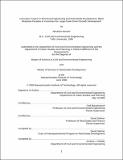Innovative topics in structural engineering and real estate development : blast resistant facades & incentives for large-scale smart growth development
Author(s)
Menzin, Abraham (Abraham Daniel)
DownloadFull printable version (2.348Mb)
Other Contributors
Massachusetts Institute of Technology. Center for Real Estate.
Advisor
Oral Buyukozturk and David Geltner.
Terms of use
Metadata
Show full item recordAbstract
This thesis is divided into two distinct parts. Part 1 relates to the requirements of the S.M.C.E.E. degree, and Part 2 relates to the M.S.R.E.D. degree. Part 1: The Influence of Boundary Conditions and Higher Mode Shapes on First-Crack Prediction for Blast-Resistant Glazing Systems: This study reviews the extent to which two commonly used assumptions in the design of blast-resistant glazing systems influence modeling results. Blast-resistant glazing designers typically model glazing by assuming that glass plates are simply supported on four edges, and that they can be represented by a single degree of freedom model that assumes one mode of vibration. In reality, glazing sealants provide elastic support, and the dynamic response of plates to blast loads consists of the superposition of several modes of vibration. This study investigates the inaccuracy caused by these assumptions by comparing conventional results to those of more sophisticated finite element analyses. (cont.) Part 2: A Survey of Incentive Programs and Strategies for Large-Scale, "Smart Growth" Developments in Massachusetts: Chapter 40R/40S, TIFIDIF/UCH-TIF, Special Development Districts, Affordable Housing Programs & Grant Programs: Politicians and legislators have placed a significant amount of emphasis on high-density, transit-oriented development as a method of dealing with the "housing crisis" in Massachusetts. However, the type of infill redevelopment projects that the state wishes to encourage often face feasibility problems related to high infrastructure costs associated with redevelopment, rising construction costs, high affordability requirements, and/or the cost of creating structured parking. This study examines the extent to which several newly created and existing programs are capable of helping large-scale smart growth projects attain feasibility and it provides strategies for using them. The surveyed programs include Chapter 40R/40S, TIF/DIF/UCH-TIF and special development districts, Affordable Housing Programs and other Grants.
Description
Thesis (S.M.)--Massachusetts Institute of Technology, Dept. of Civil and Environmental Engineering; and, (S.M. in Real Estate Development)--Massachusetts Institute of Technology, Dept. of Urban Studies and Planning, Center for Real Estate, 2006. This electronic version was submitted by the student author. The certified thesis is available in the Institute Archives and Special Collections. Includes bibliographical references (leaves 267-268).
Date issued
2006Department
Massachusetts Institute of Technology. Center for Real Estate; Massachusetts Institute of Technology. Department of Civil and Environmental Engineering; Massachusetts Institute of Technology. Department of Urban Studies and PlanningPublisher
Massachusetts Institute of Technology
Keywords
Civil and Environmental Engineering., Urban Studies and Planning., Center for Real Estate.